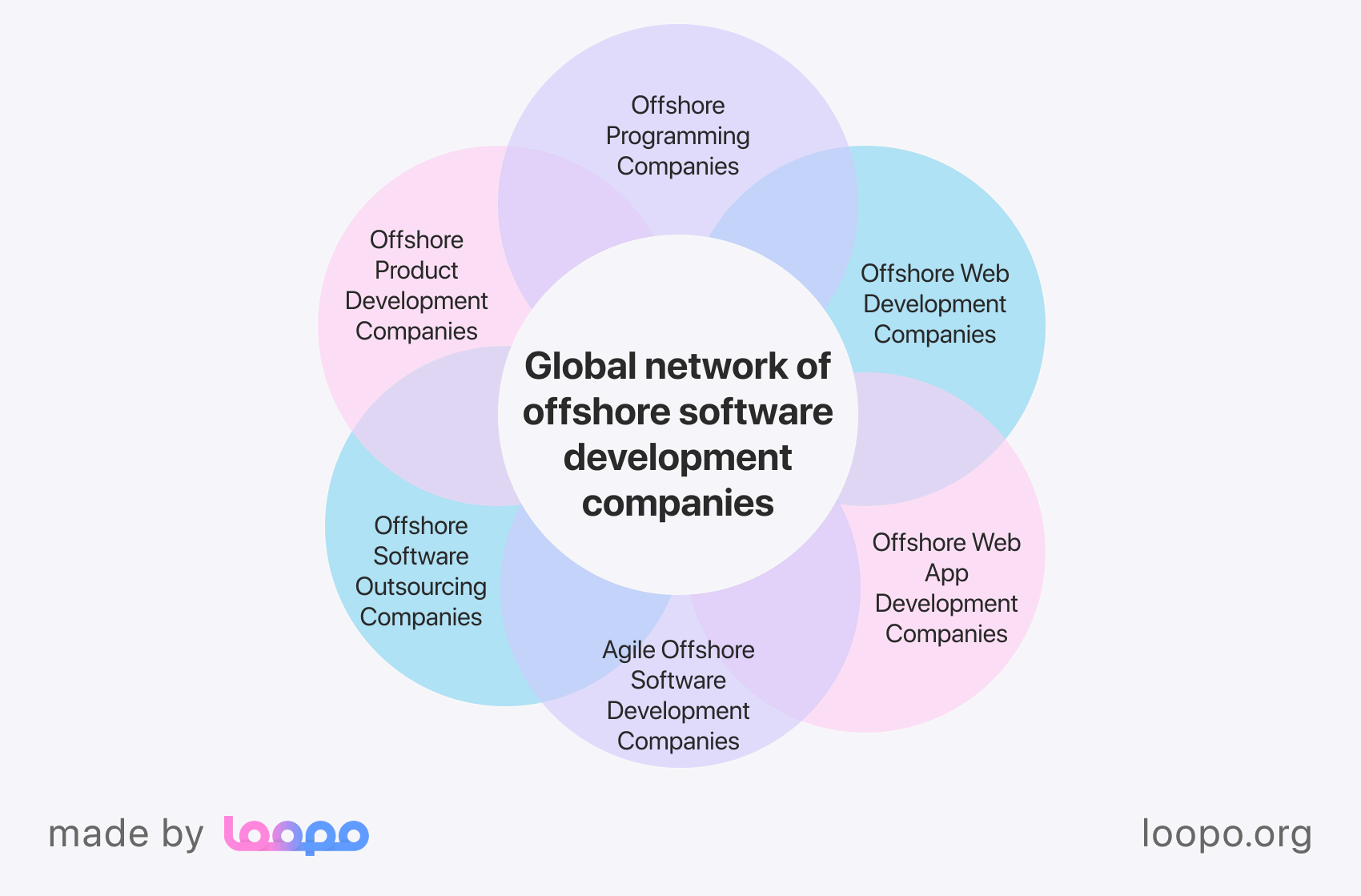Why Choose an Offshore Software Development Company: Key Benefits

In today's fast-paced and competitive business environment, leveraging the right technological expertise is crucial for sustained growth and success. Partnering with an offshore software development company offers numerous advantages that can propel your business forward. Whether you're an established enterprise or a burgeoning startup, understanding the key benefits of offshore development can help you make informed decisions that align with your strategic goals.

Understanding Offshore Software Development Companies
Offshore software development has emerged as a strategic choice for businesses aiming to enhance their technological capabilities without incurring the hefty costs often associated with in-house development. But what exactly does this entail?
What is an Offshore Software Development Company?
An offshore software development company is a firm located in a different country that provides software development services to clients worldwide. These companies specialize in creating, maintaining, and managing software applications tailored to meet specific business needs. By outsourcing to an offshore partner, businesses can access a vast pool of skilled professionals while benefiting from cost-effective solutions.
Types of Offshore Development Companies
Offshore development companies come in various forms, each catering to different aspects of software development. Some common types include:
Offshore Programming Companies: Focused on writing and maintaining code for various applications.
Offshore Web Development Companies: Specialize in building and managing websites and web applications.
Offshore Web App Development Companies: Dedicated to creating dynamic and interactive web-based applications.
Agile Offshore Software Development Companies: Employ Agile methodologies to ensure flexibility and iterative progress in projects.
Offshore Software Outsourcing Companies: Provide comprehensive software development and maintenance services as a complete outsourcing solution.
Offshore Product Development Companies: Specialize in developing specific software products from conception to deployment.

Key Benefits of Choosing an Offshore Software Development Company
Opting for an offshore partner can unlock a multitude of benefits that drive business growth and operational efficiency. Here are some of the primary advantages:
Cost Efficiency
One of the most compelling reasons businesses choose offshore development is the significant cost savings. Offshore software development companies often operate in regions with lower labor costs compared to Western countries. This allows businesses to access top-tier talent without breaking the bank, making it a cost-effective alternative to local hiring.
For instance, a company based in the USA might find that hiring developers in Eastern Europe or Southeast Asia offers substantial savings without compromising on quality. These savings can be reinvested into other critical areas of the business, such as marketing, research and development, or expanding operational capabilities.
Access to Global Talent
Offshoring opens the door to a diverse and highly skilled talent pool. Whether you need a specialized offshore software development team or expertise in emerging technologies, offshore partners can provide access to professionals with the exact skill sets required for your projects. This global reach ensures that you can find the best talent tailored to your specific needs.
Moreover, many offshore developers possess expertise in niche areas that may be scarce or expensive in your local market. This includes proficiency in specific programming languages, frameworks, or industries, enabling your business to stay ahead with cutting-edge solutions.
Scalability and Flexibility
Businesses often face fluctuating demands and project scopes. Partnering with an offshore software development company offers the flexibility to scale your development team up or down based on project requirements. This adaptability ensures that you can efficiently manage resources without the constraints of permanent hiring.
For example, during peak project phases, you can rapidly expand your development team to meet deadlines, and subsequently reduce the team size once the project is completed. This scalable approach helps maintain optimal operational efficiency and cost-effectiveness.
Enhanced Focus on Core Business
By outsourcing software development tasks to an offshore partner, businesses can concentrate on their core competencies. This strategic delegation allows internal teams to focus on what they do best, whether it's marketing, sales, or strategic planning, while the offshore team handles the technical aspects.
This division of labor not only improves overall productivity but also fosters innovation within the core areas of your business, as internal teams are free from the burdens of managing complex software development projects.
Faster Time-to-Market
Offshore development companies are adept at managing projects efficiently, leveraging time zone differences to ensure continuous progress. This can lead to faster project completion times, enabling your business to bring products and services to market more quickly and stay ahead of competitors.
For instance, a project can continue overnight with teams in different time zones, effectively reducing the overall development cycle. This accelerated timeline is particularly beneficial in industries where speed is a critical factor for success.
Quality Assurance
Reputable offshore software development companies adhere to high-quality standards and employ robust quality assurance processes. By partnering with a trusted offshore firm, you can ensure that your software solutions are reliable, scalable, and meet industry standards.
These companies often implement rigorous testing methodologies, including automated testing, manual testing, and continuous integration, to identify and rectify issues early in the development process. This proactive approach to quality assurance minimizes the risk of costly post-deployment fixes and enhances the overall user experience.
Risk Mitigation
Diversifying your development resources by partnering with an offshore company can mitigate risks associated with project delays, resource shortages, and technological challenges. Offshore partners often have contingency plans and robust project management practices in place to handle unforeseen issues effectively.
For example, in the event of a local economic downturn or a sudden spike in project demand, an offshore partner can help maintain project continuity and stability. Additionally, having multiple development centers across different geographic locations reduces the impact of regional disruptions, such as natural disasters or political instability.
Advanced Technologies
Offshore software development companies are often at the forefront of adopting and implementing the latest technologies. By partnering with such firms, you gain access to cutting-edge tools and methodologies that can drive innovation and improve your software products' functionality and performance.
For instance, many offshore firms invest in continuous training and professional development for their teams, ensuring that they stay updated with the latest technological trends and best practices. This commitment to technological advancement translates into superior software solutions for your business.
24/7 Operations
Offshore development teams can provide round-the-clock support and development cycles, thanks to different time zones. This continuous workflow can accelerate project timelines, reduce downtime, and ensure that your software development progresses efficiently without the constraints of a typical 9-to-5 schedule.
By leveraging the advantages of time zone differences, businesses can achieve a more dynamic and responsive development process. Tasks can be handed off seamlessly between teams in different regions, ensuring that work progresses steadily around the clock.
Cultural Compatibility and Communication
Many offshore software development companies emphasize cultural compatibility and effective communication strategies. By selecting a partner that aligns well with your company's culture and values, you can foster a more harmonious working relationship, enhance collaboration, and ensure that project goals are clearly understood and met.
Cultural compatibility includes understanding business etiquettes, work ethics, and communication styles, which are critical for smooth project execution. Offshore partners that prioritize cultural alignment are better equipped to integrate seamlessly with your in-house teams, promoting a cohesive and productive work environment.
Language Proficiency
Effective communication is critical in software development projects. Offshore partners from regions with high proficiency in English or other relevant languages can facilitate smoother interactions, reduce misunderstandings, and ensure that project requirements are accurately translated into actionable tasks.
Language proficiency extends beyond mere translation; it encompasses the ability to articulate complex technical concepts clearly and concisely. This proficiency ensures that all stakeholders are on the same page, minimizing the risk of misinterpretations and errors.
Boosted Innovation and Creativity
Diverse teams bring a variety of perspectives and problem-solving approaches. Collaborating with an offshore development company can infuse your projects with fresh ideas and innovative solutions, enhancing the overall creativity and effectiveness of your software products.
For example, offshore teams may introduce new design paradigms, development techniques, or business insights that you might not have considered otherwise. This diversity of thought fosters a more innovative and adaptable development process, enabling your business to create unique and competitive software solutions.
Comprehensive Support and Maintenance
Offshore software development firms often provide comprehensive support and maintenance services, ensuring that your software remains up-to-date, secure, and functioning optimally. This ongoing support can help you address any issues promptly and keep your software aligned with evolving business needs.
Maintenance services typically include regular updates, bug fixes, performance enhancements, and security patches. By partnering with an offshore provider, businesses can ensure the longevity and reliability of their software solutions, reducing the risk of downtime and enhancing user satisfaction.
Strategic Geographic Presence
For businesses aiming to expand into new markets, partnering with an offshore software development company located in your target region can provide valuable insights into local market dynamics, customer preferences, and regulatory requirements. This strategic geographic presence can enhance your market entry strategies and overall business growth.
For instance, an offshore partner in a specific region can help navigate local laws, cultural nuances, and consumer behaviors, enabling your business to tailor its software solutions to better meet the needs of local customers. This localized approach can significantly improve your chances of success in new markets.
Improved Project Management
Experienced offshore development companies utilize advanced project management tools and methodologies to ensure that projects are delivered on time, within budget, and to the highest quality standards. Their expertise in managing complex projects can help streamline your development processes and achieve better project outcomes.
These companies often employ project managers who are well-versed in industry-standard frameworks such as Agile, Scrum, or Kanban. This expertise ensures that your projects are organized, transparent, and adaptable to changing requirements, fostering a more efficient and effective development process.

Choosing the Right Offshore Software Development Company
Selecting the right offshore partner is crucial to maximizing the benefits of offshoring. Here are key considerations to help you make an informed decision:
Expertise and Experience
Evaluate the offshore company's expertise and experience in your industry. Look for a firm that has a proven track record of delivering similar projects and possesses the technical skills required for your specific needs.
For example, if your project involves developing a complex e-commerce platform, seek an offshore partner with substantial experience in e-commerce development, payment gateway integration, and user experience optimization. Reviewing their portfolio and case studies can provide valuable insights into their capabilities and past successes.
Communication and Collaboration
Effective communication is vital for successful offshore partnerships. Ensure that the company has robust communication channels, fluent language skills, and a collaborative approach to working with clients.
This includes regular updates, transparent reporting, and accessible communication platforms. Tools such as Slack, Microsoft Teams, or Zoom can facilitate seamless communication, enabling real-time interactions and efficient collaboration between your in-house team and the offshore developers.
Cultural Fit
A good cultural fit can enhance collaboration and reduce potential misunderstandings. Choose an offshore partner that shares similar values and work ethics to foster a more harmonious working relationship.
Cultural alignment includes understanding work ethics, business practices, and interpersonal communication styles. A partner that respects your company's culture and demonstrates adaptability is more likely to integrate smoothly with your team, promoting a cohesive and productive work environment.
Quality Standards
Assess the offshore company's quality assurance processes and certifications. Reputable firms adhere to international quality standards and implement rigorous testing procedures to ensure the delivery of high-quality software solutions.
Look for certifications such as ISO 9001 or CMMI, which indicate a commitment to quality management and continuous improvement. Additionally, inquire about their testing methodologies, including automated testing, manual testing, and user acceptance testing (UAT), to ensure comprehensive quality assurance.
Cost Transparency
Ensure that the offshore company provides transparent pricing structures with no hidden costs. Clear cost agreements help in budgeting and prevent any financial surprises down the line.
Request detailed proposals that outline all costs, including development fees, maintenance costs, and any additional charges for extra services. Transparent pricing fosters trust and facilitates better financial planning, enabling you to manage your project budget effectively.
Client References and Testimonials
Review client references and testimonials to gauge the offshore company's reliability, professionalism, and ability to deliver on promises. Positive feedback from previous clients can indicate a trustworthy and competent partner.
Reach out to their past clients to inquire about their experiences, project outcomes, and overall satisfaction with the company's services. This firsthand feedback can provide valuable insights into the company's strengths and areas for improvement.
Scalability
Choose an offshore partner that can scale their services to accommodate your growing business needs. Scalability ensures that the company can support your projects as they expand in scope and complexity.
For example, if you anticipate future projects or a need to expand your development team, ensure that the offshore partner has the resources and flexibility to meet these demands. A scalable partner can adapt to your changing requirements, providing ongoing support and expertise as your business evolves.
Security and Compliance
Data security and compliance with industry regulations are paramount. Verify that the offshore company follows strict security protocols and adheres to relevant compliance standards to protect your sensitive information.
Ensure that the partner complies with standards such as GDPR, HIPAA, or other industry-specific regulations relevant to your business. Additionally, inquire about their data protection measures, including encryption, secure access controls, and regular security audits, to safeguard your data and intellectual property.
Technological Capabilities
Assess the offshore company's technological capabilities and their ability to leverage the latest tools and frameworks. This ensures that your software solutions are built using modern technologies that enhance performance and scalability.
Evaluate their proficiency in the programming languages, frameworks, and tools relevant to your project. Additionally, assess their ability to adopt new technologies and methodologies as needed, ensuring that your software remains innovative and competitive in the market.
Project Management Practices
Effective project management is essential for timely and successful project delivery. Evaluate the offshore company's project management methodologies, tools, and processes to ensure they align with your project requirements.
Inquire about their project management frameworks, such as Agile, Scrum, or Waterfall, and their proficiency in utilizing project management tools like Jira, Asana, or Trello. Effective project management practices ensure that projects are well-organized, transparent, and adaptable to changing requirements.
Long-Term Partnership Potential
Consider the potential for a long-term partnership rather than a one-off project. A reliable offshore partner can become an extension of your in-house team, providing ongoing support and contributing to your business's sustained growth.
A long-term partnership fosters deeper collaboration, better understanding of your business goals, and a more integrated development process. Look for a partner that demonstrates a commitment to building a lasting relationship, offering continuous support and expertise as your business evolves.
Building a Successful Offshore Partnership
Creating a successful offshore partnership requires strategic planning, clear communication, and mutual trust. Here are some best practices to ensure a productive collaboration with your offshore software development company:
1. Establish Clear Objectives and Expectations
From the outset, clearly define your project goals, deliverables, and timelines. Setting clear expectations helps prevent misunderstandings and ensures that both parties are aligned on the project's vision and objectives.
For example, create a detailed project brief that outlines the scope, requirements, milestones, and success criteria. This document serves as a reference point throughout the project, guiding both your in-house team and the offshore developers toward a common goal.
2. Implement Robust Communication Channels
Effective communication is the backbone of any successful partnership. Utilize communication tools like Slack, Microsoft Teams, or Zoom to facilitate regular interactions, updates, and feedback sessions. Establishing a structured communication plan can help maintain transparency and keep the project on track.
Schedule regular meetings, such as weekly status updates or sprint reviews, to discuss progress, address challenges, and provide feedback. Clear and consistent communication fosters collaboration, ensures that issues are addressed promptly, and keeps everyone informed about the project's status.
3. Foster a Collaborative Environment
Encourage a culture of collaboration by involving your offshore team in brainstorming sessions, decision-making processes, and regular progress reviews. Building a sense of teamwork and shared responsibility can enhance project outcomes and foster a strong working relationship.
For instance, include offshore developers in initial planning meetings to gather their insights and expertise. This inclusive approach not only leverages their knowledge but also fosters a sense of ownership and commitment to the project's success.
4. Utilize Project Management Tools
Leverage project management tools such as Jira, Asana, or Trello to track project milestones, assign tasks, and monitor progress. These tools provide visibility into the project's status and help in managing deadlines and deliverables effectively.
By using a centralized project management system, all stakeholders can access real-time updates, collaborate on tasks, and ensure that everyone is aligned with the project's objectives. This transparency enhances accountability and streamlines the development process.
5. Ensure Knowledge Transfer
Facilitate a smooth knowledge transfer process by sharing essential project documentation, resources, and access to relevant systems. Providing comprehensive onboarding and training can help your offshore team understand your business processes and technical requirements better.
Develop detailed documentation, including technical specifications, user stories, and design documents, to guide the offshore developers. Additionally, conduct training sessions or workshops to familiarize them with your company's tools, technologies, and workflows.
6. Monitor Progress and Provide Feedback
Regularly monitor the project's progress and provide constructive feedback to your offshore team. Continuous monitoring and feedback ensure that any issues are addressed promptly and that the project stays aligned with your expectations.
Implement a feedback loop where you can review completed work, discuss areas for improvement, and acknowledge achievements. This proactive approach fosters continuous improvement and ensures that the project remains on track.
7. Maintain Flexibility and Adaptability
Be prepared to adapt to changes and unforeseen challenges during the project. Offshore partners that demonstrate flexibility and adaptability can navigate project complexities more effectively, ensuring successful project delivery even in dynamic environments.
Embrace Agile methodologies that allow for iterative development, continuous feedback, and adaptive planning. This flexibility enables your team to respond to changing requirements and evolving business needs, enhancing the project's overall success.
8. Protect Intellectual Property
Ensure that your offshore partner adheres to strict confidentiality agreements and data protection protocols to safeguard your intellectual property and sensitive business information. Implementing robust security measures can prevent data breaches and protect your business interests.
Establish clear data protection policies, enforce secure access controls, and conduct regular security audits to ensure compliance with industry standards. Additionally, include intellectual property clauses in your contracts to legally protect your proprietary information.
9. Celebrate Successes Together
Acknowledging and celebrating project milestones and achievements can strengthen your partnership and boost team morale. Recognizing the offshore team's contributions fosters a positive working environment and encourages continued excellence.
For example, host virtual celebrations or send appreciation messages when significant milestones are reached. This recognition not only motivates the offshore team but also reinforces a sense of unity and shared purpose.
Maximizing the Benefits of Offshore Software Development
To fully leverage the advantages of partnering with an offshore software development company, businesses should adopt strategies that enhance collaboration, optimize resource utilization, and drive continuous improvement.
Consider Strategic Resource Allocation
Effectively allocate your resources by balancing in-house and offshore teams based on project requirements. Strategically utilizing both internal and external resources can optimize productivity and ensure that your projects are completed efficiently.
For instance, allocate strategic planning, design, and core business functions to your in-house team while delegating development, testing, and maintenance tasks to offshore partners. This balanced approach ensures that each team focuses on their strengths, leading to higher quality outcomes and increased operational efficiency.
Learn and Develop Regularly
Encourage ongoing learning and development for your offshore team to keep up with the latest industry trends and technological advancements. Investing in your team's professional growth can enhance their skills and contribute to the overall success of your projects.
Provide access to training programs, workshops, and certifications that align with your project's technological requirements. This investment not only improves the offshore team's capabilities but also fosters loyalty and long-term commitment to your partnership.
Implement Agile Methodologies
Adopting Agile methodologies can enhance project flexibility and responsiveness. Agile frameworks, such as Scrum or Kanban, facilitate iterative development, continuous feedback, and adaptive planning, ensuring that your projects can quickly adapt to changing requirements and deliver high-quality results.
By breaking down projects into manageable sprints or tasks, Agile methodologies promote regular progress assessments, enabling timely adjustments and ensuring that the project remains aligned with your business objectives.
Leverage Automation and DevOps Practices
Integrate automation tools and DevOps practices to streamline your development processes and improve efficiency. Automation can reduce manual errors, accelerate testing, and enhance deployment processes, while DevOps fosters collaboration between development and operations teams, ensuring seamless software delivery.
For example, implement continuous integration and continuous deployment (CI/CD) pipelines to automate testing and deployment processes. This not only speeds up the development cycle but also ensures consistent and reliable software releases.
Focus on User-Centric Design
Prioritize user-centric design principles to create software solutions that meet the needs and preferences of your end-users. Collaborate with your offshore team to incorporate user feedback, conduct usability testing, and iterate on design concepts to deliver intuitive and engaging software products.
By involving end-users in the design and development process, you can ensure that the final product is aligned with their expectations and delivers a superior user experience, ultimately enhancing customer satisfaction and loyalty.
Optimize Time Zone Differences
Strategically manage time zone differences to maximize productivity and ensure continuous project progress. Establish overlapping working hours for real-time collaboration and leverage asynchronous communication methods to keep the project moving forward even when teams are not actively online.
For instance, designate specific times for daily stand-ups or status meetings where both your in-house and offshore teams can participate simultaneously. Additionally, utilize collaborative tools like shared document repositories and project management systems to facilitate asynchronous communication and task tracking.
Maintain Comprehensive Documentation
Ensure that all project-related information, including requirements, designs, and code documentation, is thoroughly documented and easily accessible. Comprehensive documentation facilitates knowledge sharing, simplifies onboarding for new team members, and ensures that project details are preserved for future reference.
Implement standardized documentation practices, such as using version-controlled repositories and maintaining up-to-date technical specifications. This consistency ensures that all team members have access to accurate and relevant information, promoting efficiency and reducing the risk of errors.
Conduct Regular Performance Reviews
Regularly evaluate the performance of your offshore team to identify areas for improvement and recognize their achievements. Performance reviews can help in setting clear expectations, providing constructive feedback, and fostering a culture of continuous improvement.
Establish key performance indicators (KPIs) to measure the offshore team's productivity, quality of work, and adherence to timelines. Use these metrics to conduct objective evaluations, address any performance issues, and celebrate successes, thereby driving overall project excellence.
Foster Innovation and Creativity
Encourage your offshore team to contribute innovative ideas and creative solutions to project challenges. Fostering an environment that values creativity can lead to the development of unique and effective software solutions that drive business success.
Implement brainstorming sessions, hackathons, or innovation workshops where offshore developers can share their ideas and experiment with new technologies. This collaborative approach not only enhances the project's creativity but also empowers the offshore team to take ownership of their contributions.
Ensure Quality Control
Implement stringent quality control measures to maintain high standards throughout the development process. Regular code reviews, automated testing, and continuous integration can help in identifying and resolving issues early, ensuring that the final software product meets your quality expectations.
Adopt best practices in software development, such as adhering to coding standards, conducting peer reviews, and utilizing automated testing frameworks. These practices ensure that the software is robust, secure, and performs optimally under various conditions.

Conclusion
Choosing an offshore software development company offers a strategic advantage by providing cost-effective solutions, access to a global talent pool, and the flexibility to scale operations as needed. Additionally, offshore partnerships bring advanced technologies, round-the-clock operations, and enhanced innovation, all of which contribute to your business's growth and efficiency. By carefully selecting the right offshore partner and implementing best practices for collaboration and project management, you can maximize the benefits of offshoring and achieve your business objectives effectively.
Explore our blog for valuable expertise, and reach out to discover the perfect solution tailored to your business!





